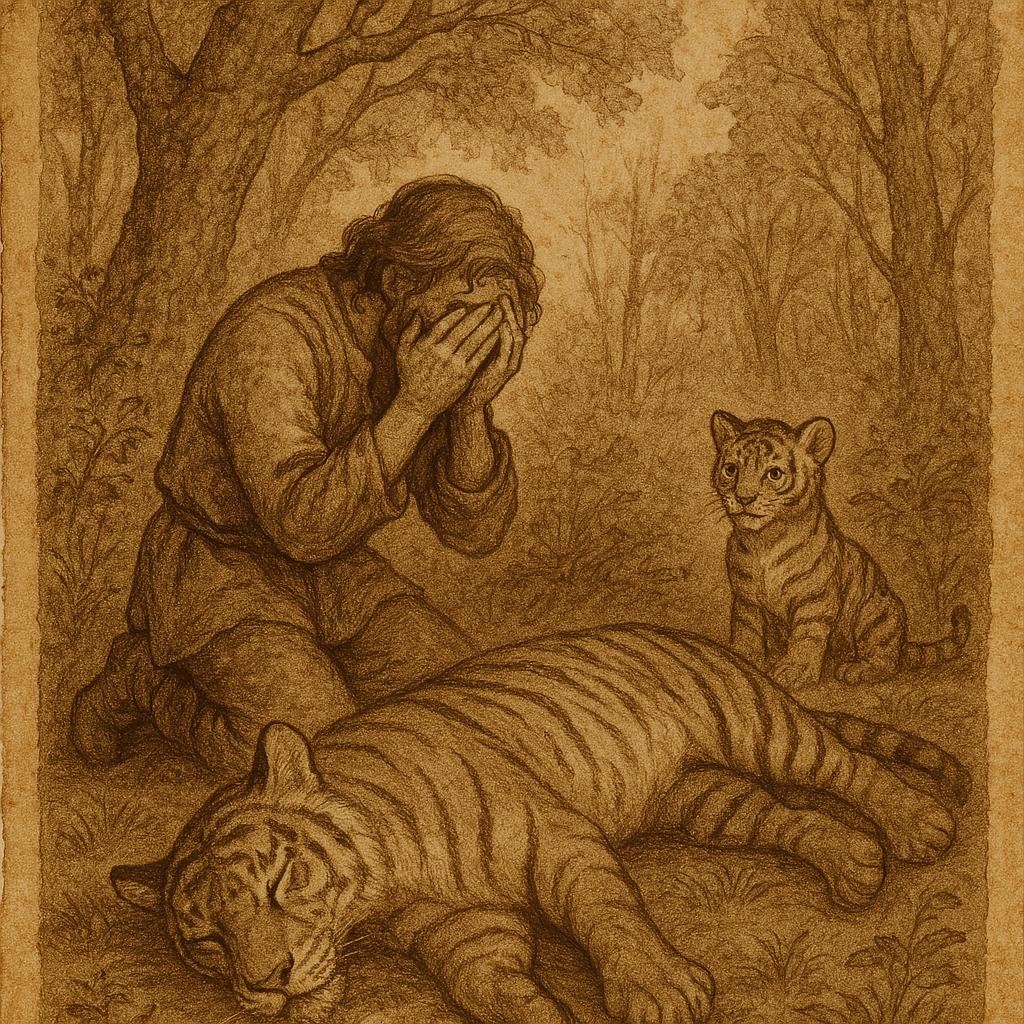Long ago in the dense forests of West Africa, where tall trees whispered to the wind and streams glittered in the sun, a man set out to hunt. He carried his bow with courage, though in his heart he felt the quiet fear of the unknown. As he moved silently among the shadows, he suddenly came face to face with a great tiger.
At first both froze. The tiger’s golden eyes burned with caution, and the man’s hands trembled as he tightened his grip on the bowstring. Each feared the other, but neither wished for blood that day.
Then the tiger spoke in a deep, calm voice. “Why do you walk my forest, hunter?”
The man steadied himself and answered, “I came seeking food, but I did not come seeking your death. If you spare me, I will not harm you.”
Surprised by the man’s honesty, the tiger lowered his head. “Perhaps we can live as friends rather than enemies. Stay in my forest home for two weeks, and see how I treat you.”
The man agreed, and so began a rare companionship.
For two weeks the hunter lived among the tiger’s family. He shared their meals, rested beneath their shade, and learned their ways. The tiger never harmed him, and in fact, treated him with kindness he had never known before. The man thought to himself, Even among beasts, I have found more honor than among many men.
When the two weeks ended, it was time for the tiger to return with the man to his village. Yet the tiger hesitated. “Friend,” he said, “will I truly be safe in your home? What if your people hate my face and kill me?”
The man placed his hand firmly on the tiger’s shoulder. “No one will touch you while I am with you. Trust me.”
So the tiger followed him to the village, bringing along his young cub. To everyone’s amazement, the great beast lived peacefully under the man’s roof for three weeks. The cub even became close friends with the man’s young son. The two played in the courtyard, chasing each other in laughter and delight.
Months later, tragedy struck. The hunter’s father died, and grief spread through his home. The tiger, upon hearing of his friend’s loss, showed a compassion rarely seen. With his cub beside him, he traveled back to the village, carrying a generous sum of money to help his grieving friend. “Take this gift,” the tiger said gently, “and know that you are not alone.”
The man wept at this kindness and embraced his friend.
But not all hearts were pure. As the tiger made his way back to the forest, two of the hunter’s companions hid in the bushes with muskets ready. Driven by fear and greed, they fired upon the tiger. He fell to the ground wounded, though not killed. His heart ached not from the pain of the shot but from the thought that his true friend might have betrayed him.
“I must know the truth,” the tiger thought.
So he returned to the place where he and the hunter had first met. There he lay down upon the earth, still and silent, pretending to be dead. He told his cub, “Watch carefully. See what the man does when he finds me.”
Not long after, the hunter passed by. At the sight of his fallen friend, he dropped his bow and rushed forward, tears streaming down his face. “Oh my brother of the forest,” he cried, “what wicked hand has done this to you?” He sat there through the night, mourning, guarding the body, and holding the cub close as if to protect the tiger’s spirit.
When dawn broke, the tiger stirred and rose. The man leapt back in shock, unable to believe his eyes.
“I am alive,” said the tiger, “and now I know the truth. You had no part in the treachery. You are a true friend.”
The hunter bowed his head, speechless.
The tiger placed a paw upon his shoulder and declared, “Go home and remember this day. For your sake, and for the sake of the loyalty you have shown me, I will never again harm a man unless he first provokes me.”
From that time forward, it was said among the Wolof people that tigers walk with dignity in the forest, sparing men unless men choose violence first.
Moral Lesson of Why Tigers Never Attack Men Unless They Are Provoked
True friendship rests on loyalty, trust, and the courage to stand by one another in times of doubt. The tiger learned that not all men are treacherous, and the man discovered that even the fiercest of beasts can show honor and kindness. The tale reminds us that respect between different beings is possible, and that betrayal comes from fear, while harmony grows from trust.
Knowledge Check: Why Tigers Never Attack Men Unless They Are Provoked
What is the central theme of the Wolof folktale Why Tigers Never Attack Men Unless They Are Provoked?
The story highlights the power of trust, loyalty, and friendship between unlikely companions.Why did the tiger agree to live with the man in his home?
The tiger trusted the man’s promise that he would be safe and protected from harm.How did the tiger show compassion when the man’s father died?
He traveled to comfort his friend and brought money to support him in his grief.Why did the tiger pretend to be dead in the forest?
He wanted to test the man’s loyalty and see if he had been part of the plot against him.What did the tiger decide after proving his friend’s honesty?
He vowed never to harm a man again unless he was provoked.What lesson does the tale Why Tigers Never Attack Men Unless They Are Provoked teach about human and animal relationships?
It teaches that trust and respect can exist even between man and beast, but betrayal destroys harmony.Cultural Origin
This folktale comes from the Wolof people of Senegal in West Africa. The Wolof are known for their rich oral traditions, where stories are passed down through generations to teach values of honor, loyalty, and respect.






